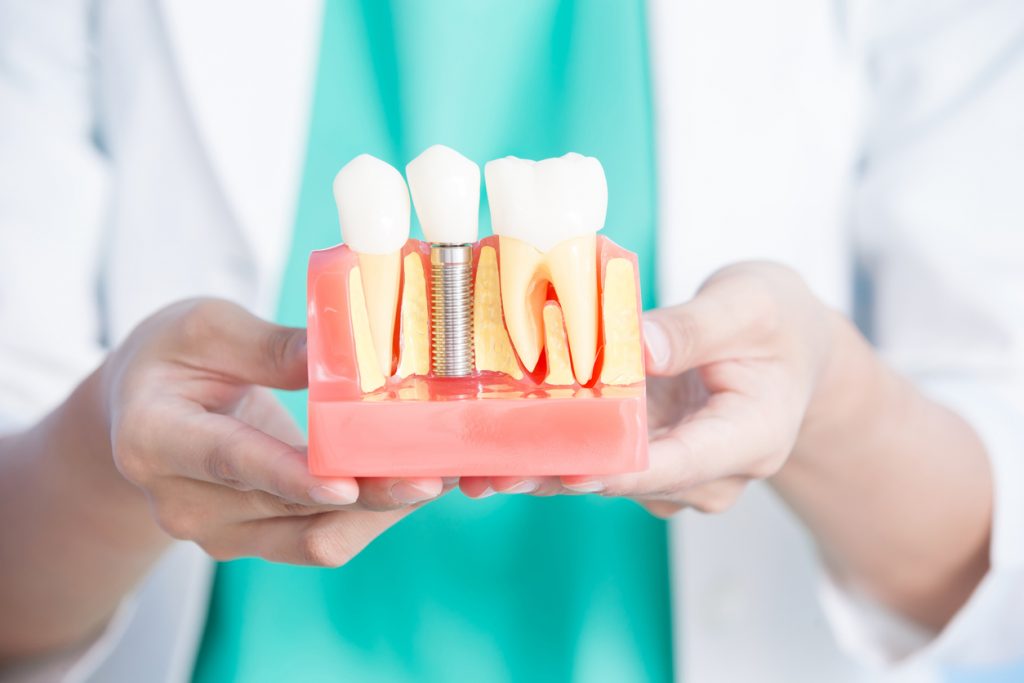
If you’re getting a dental implant, you may have to choose between a ceramic or titanium implant. Learn the similarities and differences between them so you can find the right fit.
When you lose a tooth, dental implants come to the rescue by providing a nearly perfect replica of the natural tooth. Today, titanium and ceramic (or zirconia) implants are the most common options for dental implants. But how do you know which one is best for you?
Both kinds of dental implants will match your smile, improve your speech, and enable you to eat and drink freely — all without adhesives or slipping. But there are many differences between titanium vs. ceramic dental implants. Let’s break them down!
Titanium Dental Implants
Titanium dental implants were developed in the 1960s and since then have been tested many times and proven successful in the long term. A titanium implant lasts about 20 years on average, but they’ve been known to last much longer. Because titanium is very strong, it’s quite rare for titanium implants to crack or fracture.
A titanium implant has a titanium base with an added connector (called an abutment) that holds a dental crown or denture (called a restoration). The abutment is secured onto the implant once the titanium potion is stable within your jaw, allowing for more flexibility when placing the restoration. Your dentist can replace the restoration if it becomes cracked or damaged.
Over time, the titanium implant could reveal its metallic gray appearance in unsightly ways — a dark ring might appear beneath the gum line of your tooth, or the color could show through your gums. For this reason, and because it’s easier to place a titanium implant correctly than a ceramic implant, titanium implants tend to be more affordable than ceramic implants.
Ceramic Dental Implants
Ceramic or zirconia implants are newer than titanium — they came to the United States in 2009 — but they are still very popular among patients. This is because ceramic dental implants tend to give a more natural-looking result than titanium implants. As opposed to titanium implants, the entirety of a ceramic implant is a natural bone-white color. Plus, many patients find the ceramic texture looks and feels more like a real tooth.
Unlike titanium implants, ceramic implants are installed all in one piece. This means they require more precision during placement in your jaw. Due to this complexity, as well as increased manufacturing costs, ceramic dental implants are often more expensive than titanium implants. Ceramic implants are also more prone to small cracks and fractures than titanium ones, but the repair process is easy and similar to reconstructing a natural tooth.
Similarities and Differences Between Titanium and Ceramic Dental Implants
You may have some remaining questions about ceramic vs. titanium implants:
- Which is safer? Both ceramic and titanium implants are biocompatible, meaning they easily bind and align with the natural tissue and bone in your mouth. If you have metal sensitivities, ceramic may be a better choice as titanium could cause an allergic reaction.
- Which heals faster? There is no significant difference in the healing time between titanium or ceramic implants. Initial pain, which can be managed with pain medication, will last about a week — afterward, complete healing will take 3 to 6 months.
- Which looks better? Because ceramic implants color-match with your teeth entirely, they can offer a better aesthetic appearance than titanium. With titanium implants, there is a risk that the metal base will eventually show through the gums or near the gumline.
- Which lasts longer? Titanium implants are known to last from 20 years to a lifetime. Ceramic implants are newer and are more prone to mild breakage, but have so far proven to last long as well.
Let Espire Dental help you make the right choice! Between your dental health needs and aesthetic preferences, we can help determine whether a ceramic or titanium dental implant is better for you. We’ll guide you through the process, all the way from selection to implantation to recovery. Contact us online or call (720) 699-8416 today.

